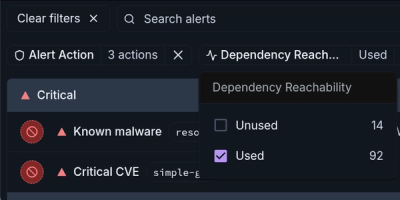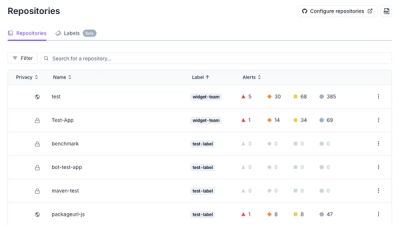
Product
Introducing Module Reachability: Focus on the Vulnerabilities That Matter
Module Reachability filters out unreachable CVEs so you can focus on vulnerabilities that actually matter to your application.
fwsp-logger
Advanced tools
Provides a pino logger that ships its logs to elasticsearch, with rotating index support.
See Configuration for details on the logger plugin config options.
Use the HydraExpressLogger plugin for Hydra Express apps:
const HydraExpressLogger = require('fwsp-logger').HydraExpressLogger;
hydraExpress.use(new HydraExpressLogger());
hydraExpress.init(...);
hydraExpress.appLogger.info('information', {and: 'an object', with: 'some stuff'});
hydraExpress.appLogger.error({err: new Error('this will log a stack trace')});
// in a request handler
req.log.info('this will also log information about the current request');
req.log.error({err: new Error('this will log a stack trace')});
with corresponding entry in config.json:
"hydra": {
"plugins": {
"logger": {
"serviceName": "foo-service",
"toConsole": false,
"noFile": true,
"elasticsearch": {
"host": "localhost",
"port": 9200,
"index": "local-dev"
}
}
}
}
Or, use the HydraLogger plugin for Hydra services:
const HydraLogger = require('fwsp-logger').HydraLogger;
let hydraLogger = new HydraLogger();
let log = hydraLogger.getLogger();
hydra.use(hydraLogger);
hydra.init(...);
// use via hydra (recommended)
hydra.log('info', 'some info');
hydra.log('error', 'just a message, no stack trace');
// or use directly - useful if you need a stack trace
log.info('some info');
log.error({err: new Error('error with stack trace')});
log.error('just a message, no stack trace');
General usage (outside of Hydra):
const PinoLogger = require('fwsp-logger').PinoLogger,
logger = new PinoLogger(
{
serviceName: 'my-app', /* required - name of the app writing logs */
logPath: '/custom/log-file.log', /* optional, defaults to ${cwd()}/serviceName.log */
elasticsearch: {
host: 'your.elasticsearch.host.com',
port: 9200,
index: 'local-dev'
}
}
);
const appLogger = logger.getLogger();
appLogger.error({err: 'An error happened'}); // pass {err} literal for proper error serialization
appLogger.info({
message: 'Something else happened',
details: {
foo: 'bar',
answer: 42
}
});
| Field | Description | Required | Default |
|---|---|---|---|
| serviceName | Name of the service doing the logging | N | hydra.serviceName |
| logPath | Path to log to if !noFile | N | service/servicename.log |
| toConsole | Log to console (stdout)? | N | true |
| noFile | Don't write log to disk | N | false |
| redact | Fields to redact (e.g. passwords, credit card numbers, etc.) | N | [] |
| elasticsearch | Connection object for ElasticSearch | N | none |
| rotate | How often to rotate ES index [daily|monthly|yearly] | N | No rotation by default |
To make sure logs are getting shipped to Elasticsearch, you can spin up docker containers with ES and Kibana using the docker-compose.yml file in this repository.
You will need docker and
docker-compose installed,
then in this project folder, launch docker-compose up.
You'll need to set up an Elasticsearch index in Kibana
before you'll be able to view logs, which should be the value of
logger.elasticsearch.index (local-dev in above examples),
or pino by default.
If you don't have any index patterns set up, Kibana won't let you proceed without adding one. Otherwise, to add additional indices, go to Settings -> Indices.
Licensed under MIT.
FAQs
Provides logging via pino, and transport to elasticsearch
The npm package fwsp-logger receives a total of 166 weekly downloads. As such, fwsp-logger popularity was classified as not popular.
We found that fwsp-logger demonstrated a not healthy version release cadence and project activity because the last version was released a year ago. It has 1 open source maintainer collaborating on the project.
Did you know?

Socket for GitHub automatically highlights issues in each pull request and monitors the health of all your open source dependencies. Discover the contents of your packages and block harmful activity before you install or update your dependencies.

Product
Module Reachability filters out unreachable CVEs so you can focus on vulnerabilities that actually matter to your application.

Product
Socket is introducing a new way to organize repositories and apply repository-specific security policies.

Research
Security News
Socket researchers uncovered malicious npm and PyPI packages that steal crypto wallet credentials using Google Analytics and Telegram for exfiltration.